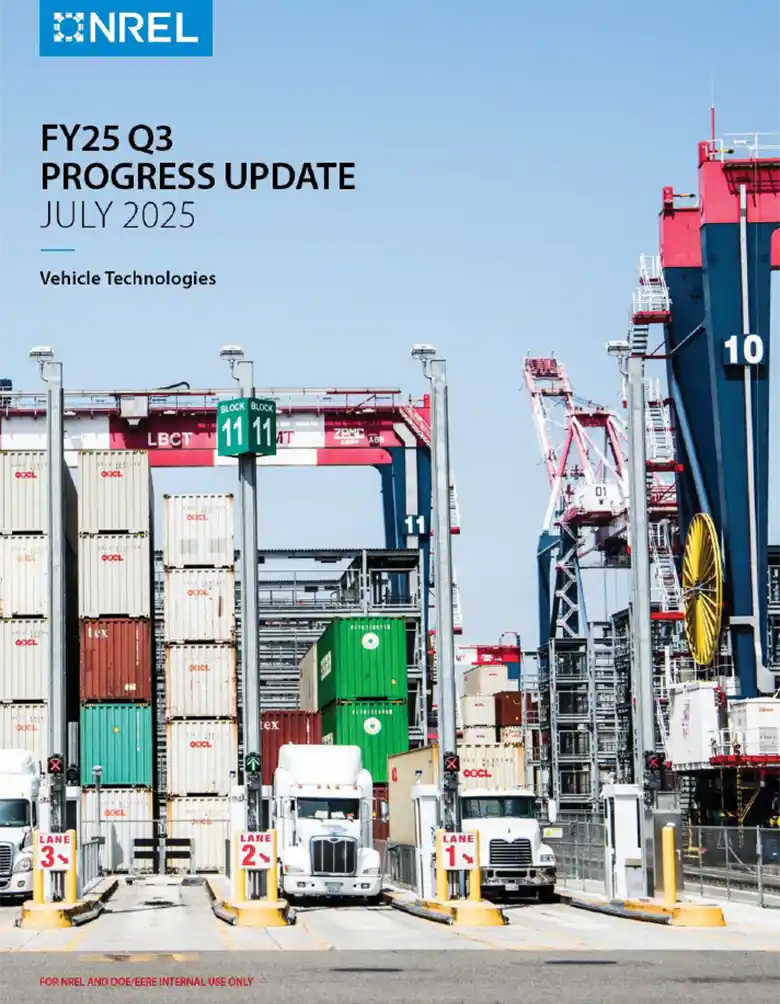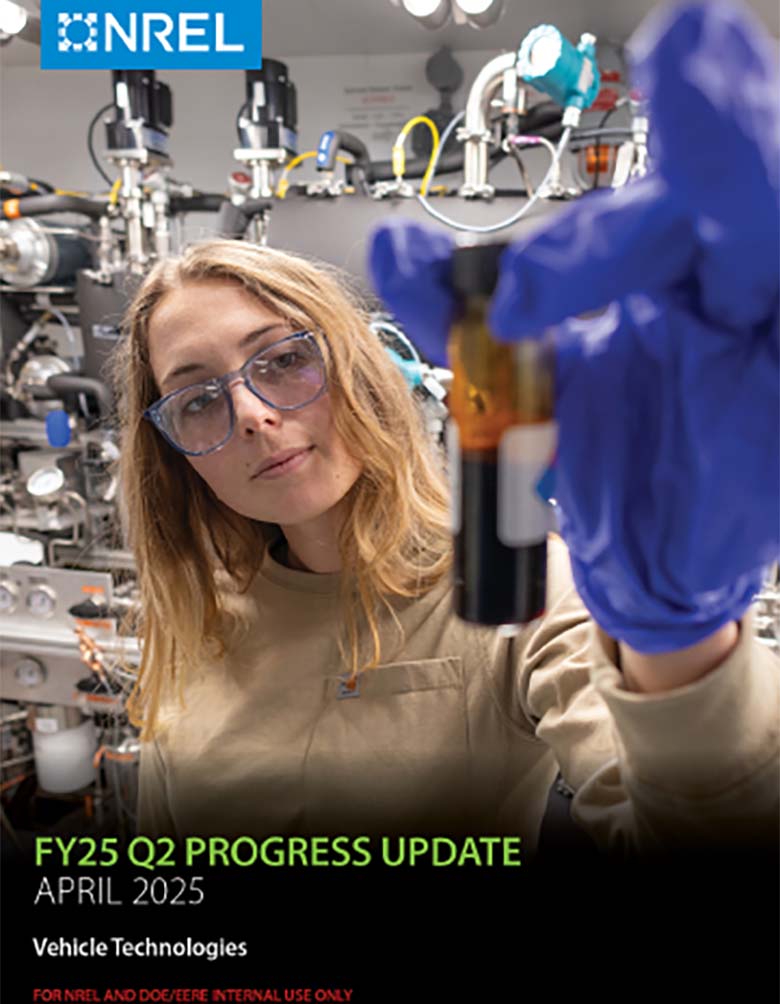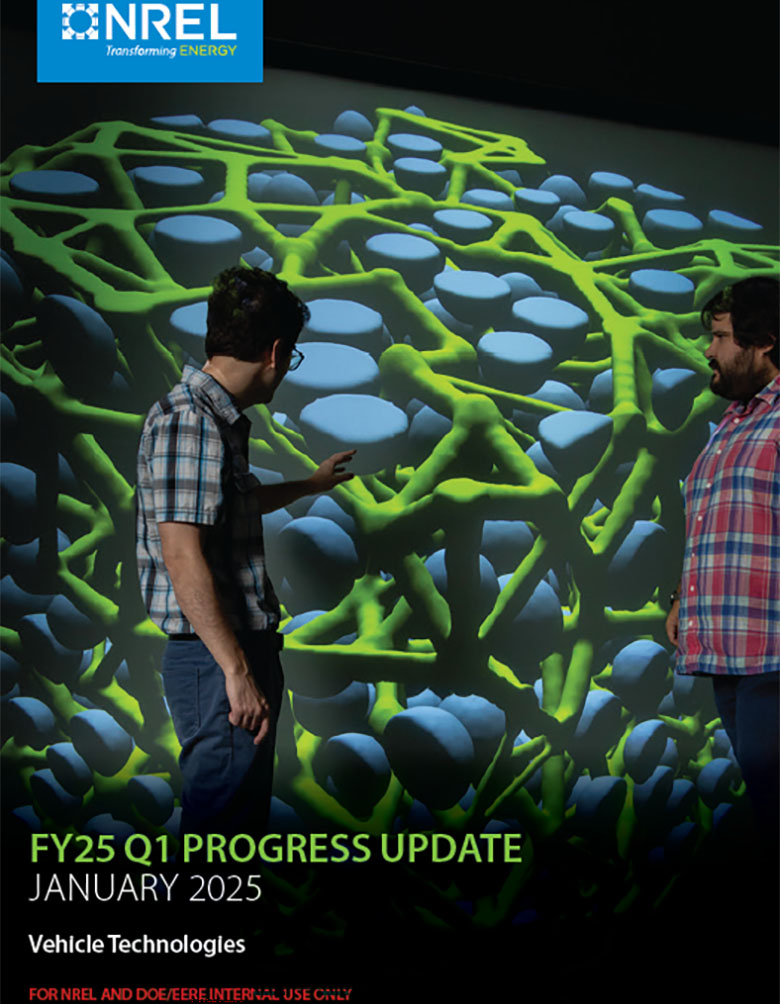Learn about NREL's progress toward researching and developing vehicle technologies with support from the U.S. Department of Energy (DOE).
View this online overview of accomplishments and/or download the full report. Also, find past annual and quarterly reports.
Read about featured projects, which represent only a small sample of NREL's R&D accomplishments.

Battery Technologies
Blended Electrolyte Additives Improve Stability of Earth-Abundant Battery Cathodes
NREL and Argonne National Lab used advanced electron microscopy to uncover key nanoscale mechanisms, guiding new electrolyte approaches that enable earth-abundant alternatives for battery cathodes instead of expensive, toxic, and supply-limited cobalt.
Automated Machine-Learning Pipeline Advances Silicon Battery Lifetime Predictions
To manage the continued uptake of new validation data that will enable informed decision-making on cell calendar life, the NREL-led Silicon Consortium Project developed an automated pipeline for processing battery lifetime predictions, uncertainty quantification, and outlier flagging.
For more details on these and other battery highlights, download the full report.
Electrification Technologies
Accelerated Aging Station Will Demonstrate How To Build a Better Commercial Powertrain
NREL designed an accelerated aging station, informing safer, more durable, and more reliable commercial vehicle designs. The station enables researchers to discover how and why power modules and converters degrade in electrified medium- and heavy-duty vehicles, using a powertrain digital twin built in partnership with Oak Ridge National Lab and Sandia National Labs.
For more details on this and other electrification highlights, download the full report.
Off-Road, Rail, Marine, and Aviation Technologies
Group Contribution Method Solidifies Accuracy of Fuel Property Prediction Models for Jet Fuels
NREL incorporated the group contribution method, a way to predict jet fuel thermophysical and combustion properties, into FuelLib—an open-source Python tool for calculating individual compound and fuel mixture properties. The method reduces both costs and time, requiring only a small volume of the prototype fuel for validation that produces results within hours.
For more details on this and other off-road, rail, marine, and aviation highlights, download the full report.
Materials Technology
NREL Determines Hybrid Composites of Multiple Fiber Types Can Maintain Performance and Lower Costs by up to 95%
To address the barriers carbon-fiber-reinforced composites face for adoption by the automotive industry, NREL designed hybrid composites of multiple fibers that retain a material's strength at a lower cost and provide ductility. Recent analysis shows the material cost can be less than $2 per kilogram of mass saved, while also lowering energy intensity.
For more details on this and other materials technology highlights, download the full report.
Technology Integration
Collaboration Enhances Understanding of Strategies and Resource Needs To Help First Responders Safely Address Electric Vehicle Incidents
Comprehensive training to provide safety training to emergency responders is largely lacking or conflicting across the United States. NREL collaborated with a Clean Cities and Communities coalition to identify strategies and resources to help emergency responders safely address incidents involving electric vehicles (EVs) under a variety of scenarios and conditions.
NREL Athena Researchers Develop Models To Inform Critical Airport Infrastructure Planning
U.S. airports are increasingly busy with more passengers and flights but must also balance growing demands on key energy infrastructure and manage costs. To help airports increase operational efficiencies and gain insights for infrastructure and grid planning, the NREL-led Athena team developed a suite of models that considers electrification solutions to be integrated into the web-based Aeroportal platform.
For more details on these and other technology integration highlights, download the full report.
Analysis
Research Team Lays Groundwork for a National Medium- and Heavy-Duty Vehicle Charging Needs Assessment
NREL developed an initial modeling approach and set of assumptions to estimate nationwide medium- and heavy-duty EV charging needs, helping planners and developers make informed decisions and avoid unnecessary costly investments. Infrastructure quantities, capital costs, and power requirements broken down by location type and charging type will be included in results.
For more details on this and other analysis highlights, download the full report.
Energy Efficient Mobility Systems
Integrating Thermal Effects Improves Accuracy of Energy Predictions in RouteE Powertrain
NREL integrated temperature sensitivity into the RouteE: Route Energy Prediction Powertrain tool using large-scale thermal simulations from the FASTSim™: Future Automotive Systems Technology Simulator to more accurately predict how ambient temperatures affect battery-EV energy consumption and driving range. The improved models reduce prediction errors by nearly 50%, especially at extreme hot and cold temperatures.
Augmented Reality Application To Track Test Connected and Automated Vehicles Offers Simulated Validation Opportunities Ahead of Real-World Deployments
For a project with ARPA-E: Advanced Research Projects Agency – Energy, NREL collaborated with Leidos, the American Center for Mobility, and the Michigan Tech Research Institute to establish a framework to track test connected and automated vehicles in a simulated environment informed by real-world drive cycles. This work enables early-stage evaluation without the risk of public road testing and reduces costs by substituting simulated vehicles for real ones.
For more details on these and other energy efficient mobility system highlights, download the full report.
Discover how NREL is spreading the word about its DOE-supported R&D activities through publishing and outreach. For a list of all publications, download the full report.

Meet our multidisciplinary team of researchers and leaders across NREL, transforming vehicle technologies for the future.

Robert McCormick
Advanced Biofuels and Combustion
Andrew Kotz
Commercial Vehicle Technologies
Monte Lunacek
Data Sciences
John Kisacikoglu
Electric Vehicle Grid Integration
Kandler Smith
Energy Storage
Systems Data Science and Modeling
Rob Tenent
Energy Storage
Advanced Cathode Material Development
Andrew Colclasure
Energy Storage
Materials Development and Modeling
Erin Andrews-Sharer
Legislative/Regulatory Support
Nicholas Rorrer
Lightweight and Recyclable Composite Materials
Andrew Duvall
Mobility Systems
Doug DeVoto and Gilbert Moreno
Power Electronics and Electric Machines
Emmy Feldman
Technology Integration/Data and Tools
Abby Brown
Technology Integration/Technical Assistance
Brennan Borlaug
Vehicle Modeling and Analysis
Adam Bratis
Associate Lab Director
BioEconomy and Sustainable Transportation
Alex Schroeder
Laboratory Program Manager (Acting)
Vehicle Technologies Office
Chris Gearhart
Director
Integrated Mobility Sciences
Ray Grout
Director
Computational Science
Matt Thornton
Director
Energy Conversion and Storage Systems
Jao Van de Lagemaat
Director
Chemistry and Nanoscience
Tony Burrell
Chief Technologist
Energy Storage
Ken Kelly
Chief Engineer
Commercial Vehicle Electrification
Faisal Khan
Principal Researcher
Power Electronics
Andrew Meintz
Chief Engineer
EV Charging and Grid Integration
Ahmad Pesaran
Chief Engineer
Energy Storage
Margo Melendez
Chief Engineer
Transportation Technology Deployment and Integration
Stan Young
Technical Lead
Advanced Mobility
Sarah Cardinali
Group Manager
Transportation Technical Assistance
Mark Chung
Group Manager
Mobility Infrastructure and Impacts Analysis
Marc Day
Group Manager
High-Performance Algorithms and Complex Fluids
Gina Fioroni
Group Manager
Fuels and Combustion Science
Venu Garikapati
Group Manager
Behavior and Advanced Mobility
Jeff Gonder
Group Manager
Transportation Energy Transition Analysis
Cabell Hodge
Group Manager
Analysis of Vehicle and Infrastructure Deployment
Wesley Jones
Group Manager
Scientific Computing
Matt Keyser
Group Manager
Electrochemical Energy Storage
Jason Lustbader
Group Manager
Advanced Vehicles and Charging Infrastructure
Juliane Mueller
Group Manager
AI, Learning, and Intelligent Systems
Sreekant Narumanchi
Group Manager
Advanced Power Electronics and Electric Machines
Nate Neale
Group Manager
Interfacial Materials Chemistry
Kristi Potter
Group Manager
Data, Analysis and Visualization
Alex Schroeder
Group Manager
Electric Vehicle Charging
Lauren Spath Luhring
Group Manager
Transportation Applications and Data Analysis
Liz Weber
Group Manager
Sociotechnical Transportation Engagement Projects
Jaquelin Cochran
Associate Lab Director
Strategic Energy Analysis and Decision Sciences
John Farrell
Associate Lab Director
Mechanical and Thermal Engineering Sciences
Juan Torres
Associate Lab Director
Energy Systems Integration
Bill Tumas
Associate Lab Director
Materials, Chemical, and Computational Sciences

Fiscal Year 2025 Q3 Report
The full report features all detailed R&D highlights, annual operating changes and milestones, and a list of all publications published during the fiscal year.
DOWNLOADPast Reports
Share
Last Updated July 30, 2025


